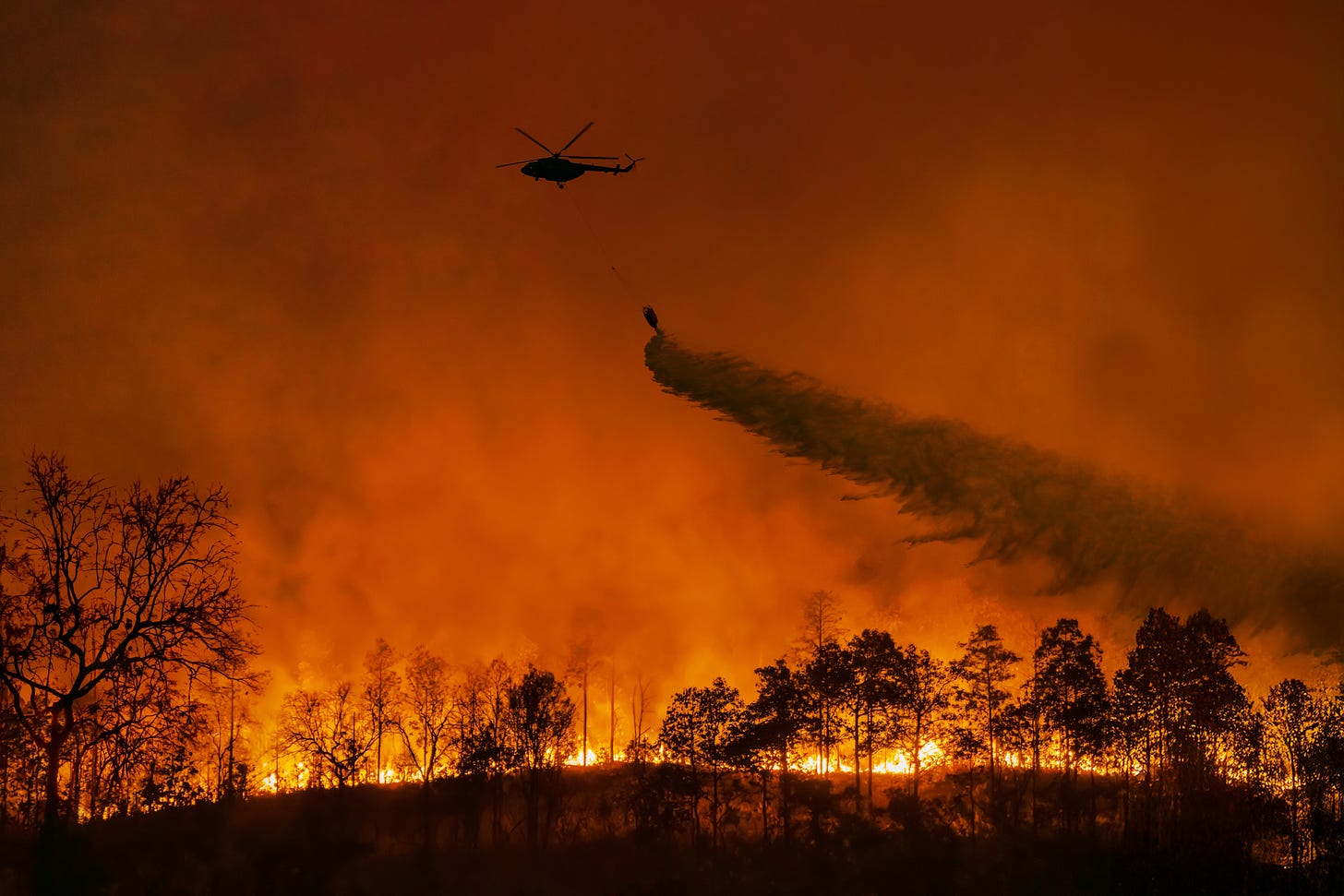What Happened?
The wildfires around Los Angeles that began on Tuesday, Jan. 7, represent one of the most severe environmental disasters in the city’s history. As of Jan. 17, nearly 14,000 personnel have been deployed, alongside the use of 1,400 fire engines and 84 aircraft, to contain the fires. The fires have already claimed 29 lives and caused catastrophic damage across the region.
As of January 27, the fires collectively destroyed at least 12,000 structures and burned more than 37,800 acres, according to Cal Fire.
While these numbers highlight the scale of destruction, they fail to capture the deeply personal impact on those who call these areas home.
For Georgetown students from LA like CC Mesa (SFS’ 26) and Sarah Fritz (CAS’ 26), the fires have brought emotional and psychological stress. Mesa, whose family narrowly avoided evacuation, has been focused on supporting friends more directly affected in the area. Fritz described the stress of learning the flames were approaching her family home, forcing her parents to evacuate.
"I still have The New York Times fire tracker open on my phone and have been updating it since that Wednesday morning because they provided live updates,” said Fritz.
Emotional Hardships
The severity of the fires and the gravity of the situation for people living in LA is felt in almost every corner of the nation.
"At this point, every single person knows someone who's lost a home,” said Mesa. "The scale is such that, even though Georgetown students are at this kind of removed angle, the impact is undeniable."
To Hoyas whose hometown has been ravaged, juggling being informed, supporting loved ones, and processing personal loss has been a struggle.
Many individuals have experienced a sense of removal or separation, unable to directly assist while others suffered.
“I can see these images, send support, and relate to it as someone from the place, but not being able to take any kind of discernible action—other than donating—feels hard.” Mesa said, “And even then, it's like, what do you donate to? So many people have been affected.”
"Every time I opened Instagram in the days after the fire, there was a new story from a friend—sometimes people I hadn't spoken to since elementary school—sharing that their houses were gone,” Fritz recalled. “GoFundMe campaigns were everywhere, which was such a sobering thought because it’s so difficult to imagine not having a home to go back to."
Despite the deep emotional and psychological toll and distress over systemic shortcomings, Angelenos expressed hope and resilience, as well as comfort from numerous support of their community.
“A lot of people here at Georgetown have reached out just to check in on me and ask how my family is, which I appreciate. It has really demonstrated how strong the Georgetown community is,” Mesa shared.
Causes of the Fires
As the community recovers from the shock of the unexpected disasters, the question of “why” remains. While wildfires have long impacted California on a semi-regular basis, climate change has amplified their intensity in recent years.
"You can never say that climate change is the sole cause of these disasters, but it is clear that climate change sets the stage, and as it affects more places, it will increase the frequency of disasters,” said Professor Bartley, a faculty member at Earth Commons and the Department of Sociology.
He pointed out that climate change creates a "whiplash effect,” which refers to the rapid and extreme shifts in weather patterns that create contrasting conditions over a short time.
Rising temperatures, prolonged droughts, and rapid shifts between wet and dry periods create ideal conditions for wildfires. UCLA researchers estimate that unusually hot weather in 2024 contributed to 25% of the dry conditions fueling these fires.
While the LA fire was not uniquely devastating or unexpected compared to the 2023 Hawaii wildfires and recent Canadian wildfires, the difficulty in containing them, in spite of the massive capacity, experience, and resources of the LAFD was shocking.
Anger and frustration with delayed governmental actions and inadequate preparedness for a recurring natural disaster have been brewing.
"Because we have fires every year, it just makes me feel kind of dismayed that the fire department is still underfunded or not taken nearly as seriously or as necessary for public safety,” Mesa contended, citing recent cuts in the fire department budget and staffing level.
Understanding the causes of these fires reveals not only the environmental risks but also the deeper challenges facing communities as they navigate the aftermath.
Sociopolitical Implications
The wildfires have also exposed inequities in recovery efforts. While wealthier communities may have resources to rebuild, middle- and lower- income neighborhoods face greater financial challenges, including rising insurance costs as they look to prepare for future disasters. Addressing these disparities will require inclusive policies that prioritize both sustainability and equity.
When asked about her views on the socioeconomic dimension of the incident, Fritz emphasized that even for wealthier individuals, losing a home is a deeply traumatic experience, regardless of financial privilege.
"People online say, ‘Oh, it’s fine because they’re rich, and they’ll rebuild.’ But that discounts how traumatic and heartbreaking it is to lose your home, your memories, and your possessions. Money doesn’t negate that experience”, she said.
Mesa agrees, sharing that while there is a wealth dimension to it, many people's places of employment and livelihoods are also gone. “To me, [the wealth angle] just seems empty."
However, Mesa calls attention to the issue of skyrocketing housing prices due to fire and natural disaster insurance price surges. Even though people might not lose their homes to the fire, she shared, many will struggle to afford to continue living there. While wealth does not shield families from the effects of the fire, it does enhance their ability to sustain living in a place like Los Angeles.
Professor Bartley observes that the problem of insurability is not unique to California. Many coastal areas, including Florida and New York, also face the same problems.
“Surely this will change where people can live, but we cannot simply tell people to relocate," he argued. "When the market is unable to guarantee insurance on its own, we need governments to step in, as they do with government-backed flood insurance.”
Adapting to—not just preventing— the consequences of climate change requires more government action and coordination between the public and private sectors.
Next Steps
Los Angeles is almost out of the woods. As of Jan. 29, The Palisades Fire is 96% contained, Eaton Fire is 99% contained. The Hughes Fire fueled by the return of the Santa Ana winds on the 22nd threatened millions’ physical safety and emotional well-being but is now 98% contained.
Addressing both immediate recovery and long-term prevention is essential. Both Mesa and Fritz believe that systematic reforms and initiatives like improving emergency response systems, advocating for climate-resilient policies, and raising public awareness are crucial steps forward.
Successful implementation of these initiatives is often obstructed. General persistence of “Ignorance is bliss" attitudes, according to Mesa, delay collective action on climate change. For Fritz, efforts to combat climate change in California—such as promoting electric cars and investing in renewable energy—often carry unintended consequences, including pollution from manufacturing facilities and potential tax increases.
“Raising awareness about fire prevention, climate change, and its measurable impacts is essential, particularly in a large, populous state like California,” Fritz emphasized, noting the complex trade-offs these efforts impose on different communities.
Professor Bartley highlights that we can all do more individually to drive meaningful change in the environmental sphere. In addition to reducing our consumption of red meat and using less oil-based transportation, we can vote and communicate in ways that prioritize climate action.
Discussing climate change is crucial because even those who acknowledge its reality and the need for action often avoid addressing it. This avoidance stems from emotional distress and the difficulty of thinking and talking about the issue in concrete, actionable terms.
“Building our capacity to talk about this issue not only makes us more serious about it but also more comfortable and better at working together on constructing a solution,” he explained.
Conclusion
The Los Angeles wildfires remind us that behind the statistics are real lives forever changed. As Hoyas, we can contribute by fostering awareness, supporting meaningful policy changes, and offering emotional support to those affected.
“Just show kindness,” Mesa said. “at the end of the day, it's a city. It's people's businesses. It's people's workplaces. It's people's homes.”






